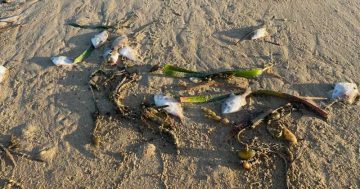 1. This week 10 years ago, legislation was introduced into Parliament to give eligible fathers and partners financial support to take parental leave to bond with their new baby.
1. This week 10 years ago, legislation was introduced into Parliament to give eligible fathers and partners financial support to take parental leave to bond with their new baby.
Minister for Families, Jenny Macklin said having a baby was a big moment in a family’s life and she wanted both parents to have support to take time off.
“Eligible working dads and other partners, such as same-sex couples, will have access to two weeks Government-funded Dad and Partner Pay at the National Minimum Wage [about $590 a week before tax],” Ms Macklin said.
“This new payment will give families more options to balance work and family commitments,” she said.
2. Minister for Workplace Relations, Bill Shorten announced the abolition of the Australian Building and Construction Commission, and its replacement with the Office of the Fair Work Building Industry Inspectorate.
Mr Shorten said penalties for breaches of industrial law would also be brought into line with those in the Fair Work Act 2009.
“Compulsory examination notices will be retained, however, they will now be subject to a number of significant safeguards,” Mr Shorten said.
He said the new legislation balanced the requirements to ensure compliance with the law and the fair treatment of individuals in the building and construction industry.
3. Figures from the Australian Bureau of Statistics (ABS) revealed the proportion of deaths in Australia from heart disease decreased over the previous decade.
The ABS report found heart disease accounted for 15 per cent of all deaths in 2010, compared with 20 per cent in 2001.
“Over the last 10 years the proportion of deaths due to circulatory diseases has decreased, from 38 per cent in 2001 to 32 per cent in 2010,” the ABS said.
It said deaths due to dementia and Alzheimer’s disease more than doubled over the 10 years, accounting for 6.3 per cent of all deaths in 2010 compared with 2.9 per cent in 2001.
4. The Australian-first National Anti-Corruption Plan was announced by the Attorney-General, Nicola Roxon to enlist public support to expose Public Service, political and business corruption.
Ms Roxon said while Australia was well equipped to respond to corruption threats it could not become complacent.
“I’m calling on the community to provide input into how Australia can effectively address emerging corruption risks and respond decisively to corruption in both the public and the private sectors,” Ms Roxon said.
“A national plan underlines Australia’s zero-tolerance attitude towards corruption and will ensure coordination of anticorruption efforts across the nation,” she said.
5. The Community and Public Sector Union (CPSU) called on the Government to get serious about cutting expenditure on consultants, after media reports revealed $2 billion had been spent on consultancy firms over the previous four and a half years while jobs were being lost from the Public Service as part of a savings drive.
National Secretary of the CPSU, Nadine Flood said she thought most Australians would be outraged that such a large amount of taxpayers’ money was going to a handful of multinational companies while essential frontline services and jobs were disappearing.
“The Federal Government appears to have developed a long-term dependence on expensive contractors to do work, much of which could — and should — be done inhouse,” Ms Flood said.
6. Also this week a decade ago, Chair of Safe Work Australia, Tom Phillips released a report on workplace skin diseases that found the conditions were costing more than $33 million annually.
Mr Phillips said occupational skin disease was the second most common work-related disease presented to GPs in Australia; skin exposure to chemicals and occupational skin disease were serious workplace health issues that had a large impact on the Australian economy each year.
“Occupational contact dermatitis is a preventable disease if the proper work health and safety systems are in place,” Mr Phillips said.
He said the main industries impacted were health and community services, hospitality, construction, agriculture, forestry and fishing.






